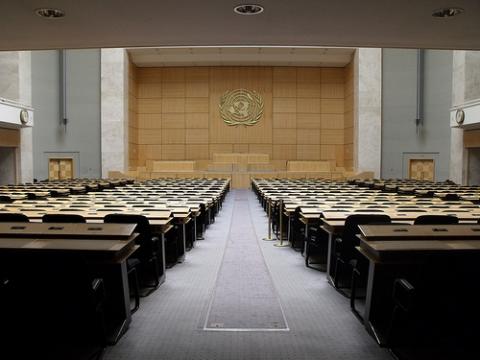In the wake of the storm: the UN and state-building

Trust in the UN has been eroding steadily for the past decade. In the first of a two-part series, its decline as trusted arbiter of world affairs is traced. By Justin Frewen.
As the scope of international invention continues to expand in Libya with no sign of any conclusion in sight and references being made of it becoming another Somalia, it would be no surprise if somewhere down the road it becomes labelled as a ‘Failed State’ or, at the very least, a country in need of ‘state-building’ support. Should this happen, it could very well become the next in a long line of countries that the United Nations (UN), takes a central role in advising on, developing and implementing a ‘new and improved’ political system. However, there is little evidence from previous UN efforts in this area that Libyans will be able to freely determine their own future political trajectory or that the process will be a success.
The first decade of the 21st century was a bad one for the UN, as its credibility took a serious battering. The international furore created by the Volker report on the UN administration of the Iraq sanctions prior to the 2003 invasion; accusations of corruption against the previous UN Secretary General Kofi Annan’s son; and allegations of financial impropriety on the part of the head of the Iraqi Oil-for-food programme were all a source of significant embarrassment to the UN.
Moreover, UN peacekeepers, who had been sent to help maintain peace and ensure the safety of civilian populations in war-torn areas, were accused of having engaged in rape and the forced prostitution of women and young girls in countries such as the Congo. Since their arrival in Haiti in 2004, UN peacekeepers have also been accused of not only failing to protect ordinary Haitians from death squads and colluding with extremist forces threatening Lavalas Party and Aristide supporters but also of having been involved in a range of atrocities, including murder and rape.
To add to its woes, the failure of the UN to satisfactorily resolve the dispute amongst members of the UN Security Council (UNSC) regarding the invasion of Iraq dealt a substantial blow to the international legal order. The UN has become widely regarded by many outside the Global North as no longer being a neutral organisation, if it ever was. For many in the Global South international law has become little more than an instrument of neo-colonialist policy with the UN being regarded, at best, as a toothless body powerless to prevent this development or, at worst, a willing collaborator in this process.
This declining confidence in the UN has led to a situation where its personnel are obliged to implement substantially upgraded security measures and precautions upon their deployment to post-conflict or politically volatile regions. While it is true that UN peacekeepers monitoring truces and maintaining regional security had frequently been targeted in the past - Ireland alone has suffered 86 peacekeeping fatalities in these missions – UN personnel had in general been free from such incidents.
The attack on the UN office in Baghdad in 2003, however, firmly removed any lingering shreds of doubts the organisation might have had regarding the relative immunity of its personnel. As the decade drew to a close, the coordinated assault on a UN guesthouse in Kabul on 28 October 2009, which resulted in 12 deaths, confirmed that the organisation was now vulnerable to being regarded as a legitimate target. Furthermore, the propaganda value of such operations, in terms of the media coverage they received, cannot have been lost on other groups contemplating similar action.
The targeting of UN personnel has raised questions about the continuing viability of the organisation’s operations in conflict areas. How can the UN ensure the personal security of its personnel while still expecting them to implement and oversee its operations? This dilemma became ever more evident after the Kabul attack when the UN’s Secretary General Ban-Ki Moon was obliged to announce the temporary evacuation of 50% of the UN personnel in Afghanistan.
And yet a mere two decades ago, as the enmities of the Cold War had started to slowly fade away, political leaders around the world had expressed their desire to create and foster a new international framework based on mutual cooperation.
Optimism soared ever higher when the military action launched by the US-led forces, acting under UN Security Resolution 678, to expel Iraqi soldiers from Kuwait, saw an unprecedented unanimity and coherence of action on the part of the global community. For many commentators the divisive political rivalries of the cold war were now a historical curiosity. The international community together with the UN would now be free to work together to establish a better and more secure world for all. As George Bush senior remarked in a speech to congress in September 1990:
… a new world order - can emerge: a new era - freer from the threat of terror, stronger in the pursuit of justice, and more secure in the quest for peace. An era in which the nations of the world, East and West, North and South, can prosper and live in harmony....A world where the rule of law supplants the rule of the jungle. A world in which nations recognize the shared responsibility for freedom and justice. A world where the strong respect the rights of the weak.
Today, with the benefit of hindsight, it is clear that the optimism shared by so many was little more than an empty pipedream or, perhaps more accurately in the case of many of the political leaders in the North, a self-serving myth by means of which they hoped to advance their global objectives.
Image top: hesterr.
